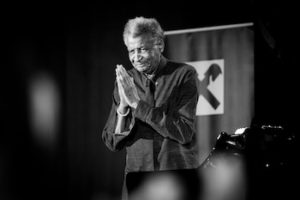
Abdullah Ibrahim
*Abdullah Ibrahim was born on this date in 1934, formerly known as Dollar Brand, he is a Black South African pianist and composer.
Ibrahim was born in Cape Town, South Africa, and was baptized Adolph Johannes Brand. He attended Trafalgar High School in Cape Town's District Six, and began piano lessons at the age of seven, making his professional debut at 15. He is of mixed-race heritage, making him a Coloured person according to the apartheid system. His mother played piano in a church, the musical style of which would remain an influence; in addition, he learned to play several genres of music during his youth in Cape Town, including marabi, mbaqanga, and American jazz.
He became well known in jazz circles in Cape Town and Johannesburg. In 1959 and 1960, Ibrahim played with the Jazz Epistles group in Sophiatown alongside saxophonist Kippie Moeketsi, trumpeter Hugh Masekela, and trombonist Jonas Gwangwa. in January 1960, the six musicians went into the Gallo studio and recorded the first full-length jazz LP by Black South African musicians, Jazz Epistle Verse One, with 500 copies being produced. Although the group avoided explicitly political activity, the apartheid government was suspicious of it and other jazz groups. It targeted them heavily during the increase in state repression following the Sharpeville massacre in March 1960, and eventually, the Jazz Epistles broke up.
Ibrahim moved to Europe in 1962. In February 1963, his wife-to-be, Sathima Bea Benjamin (they married in 1965), convinced Duke Ellington, who was in Zürich, Switzerland, on a European tour to hear Ibrahim perform. After the show, Ellington helped set up a recording session with Reprise Records: Duke Ellington Presents The Dollar Brand Trio. A second recording of the trio (with Ellington and Billy Strayhorn on piano) performing with Sathima as a vocalist was recorded but remained unreleased until 1996 (A Morning in Paris, under Benjamin's name).
Ibrahim and Benjamin moved to New York in 1965. That year he played at the Newport Jazz Festival, followed by a first tour through the US; in 1966, Ibrahim substituted for Duke Ellington on five dates, leading the Duke Ellington Orchestra. In 1967, a Rockefeller Foundation grant enabled him to study at the Juilliard School of Music in New York. While in the US, he interacted with many progressive musicians, among them Don Cherry, Ornette Coleman, John Coltrane, Pharoah Sanders, Cecil Taylor, and Archie Shepp.
As the Black Power movement developed in the 1960s and 1970s, it influenced several of Ibrahim's friends and collaborators, who began to see their music as a form of cultural nationalism. Ibrahim, in turn, began to incorporate African elements into his jazz. Ibrahim briefly returned to Cape Town in 1968, where he converted to Islam that year (with the resultant change of name from Dollar Brand to Abdullah Ibrahim), and in 1970 he made a pilgrimage to Mecca. The composition "Mannenberg" was recorded in June 1974. That and the recordings "Black Lightning,"; "African Herbs,"; and "Soweto Is Where It Is At" mirrored and spoke of the defiance in the streets and townships of South Africa – gave impetus to the genre of music known as "Cape Jazz." "Mannenberg" came to be considered "the unofficial national anthem" of South Africa and the theme tune of the anti-apartheid movement.
A few months after the release of "Mannenberg", South African police fired upon protesting children during the Soweto Uprising that began in June 1976; this event led Ibrahim and Benjamin to publicly express support for the African National Congress, which was still banned at the time. Starting in 1983, Ibrahim led a group called Ekaya (which translates as "home"), as well as various trios, occasional big bands, and other special projects.
Over the decades, he has toured the world extensively, appearing at major venues either as a solo artist or playing with other musicians, including Max Roach, Carlos Ward, and Randy Weston, as well as collaborating with classical orchestras in Europe. With his wife, the jazz singer Sathima Bea Benjamin, he is the father to the New York underground rapper Jean Grae, as well as to a son, Tsakwe.